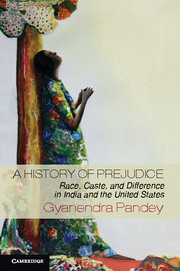4 - “Double V”
The Everyday of Race Relations
Published online by Cambridge University Press: 05 February 2013
Summary
The last chapter should have shown how Dalits used the idea of conversion out of the dominant religion of India to claim their rights as citizens and to call for an altered social and political arrangement in the country. For people of African descent in the USA, the idea of conversion (or of opting out) has had a rather different history. Physically removed from the African part of their heritage, they were converted to the new religion of Christianity, or various forms of it, in the late eighteenth and nineteenth centuries. (As we know, different kinds of conversion, not least to a new form of Islamic solidarity, continued strongly in the twentieth century, but these were less pervasive.) Over that time, it became increasingly obvious to African Americans that they were as American as any other immigrants to the country, and they demanded their rights as Americans. To do so, they appropriated the reigning political slogan in the United States, the idea so eloquently and loudly proclaimed in the constitution of 1788 and since, of the common rights of all inhabitants of the land, “We the people…” – not to mention a central proposition of the Bible, “All men are brothers.…” Quite self-consciously, then, and with increasing militancy over the middle decades of the twentieth century, it was for African Americans a matter not of opting out but opting in.
I need to reiterate that opting out and opting in are not polar opposite, irreconcilable options, for there is no clear-cut out or in for most subordinated groups in a society. It is necessary to emphasize that, as with the Dalits, there was no single strategy or platform that African Americans as a body adopted for the amelioration or advancement of their social, political, and economic condition. Through most of the second half of the nineteenth century and all of the twentieth, there were those who worked for integration in order to eradicate racial and caste privileges, and there were black nationalists who spoke of the need for a separate geopolitical space for African Americans – most notably represented, it is said, in the Garveyite call for a return to Africa (although even in Garvey's case what was at stake was the redemption of Africa, and by that means the redemption of people of African descent everywhere).
- Type
- Chapter
- Information
- A History of PrejudiceRace, Caste, and Difference in India and the United States, pp. 97 - 130Publisher: Cambridge University PressPrint publication year: 2013

